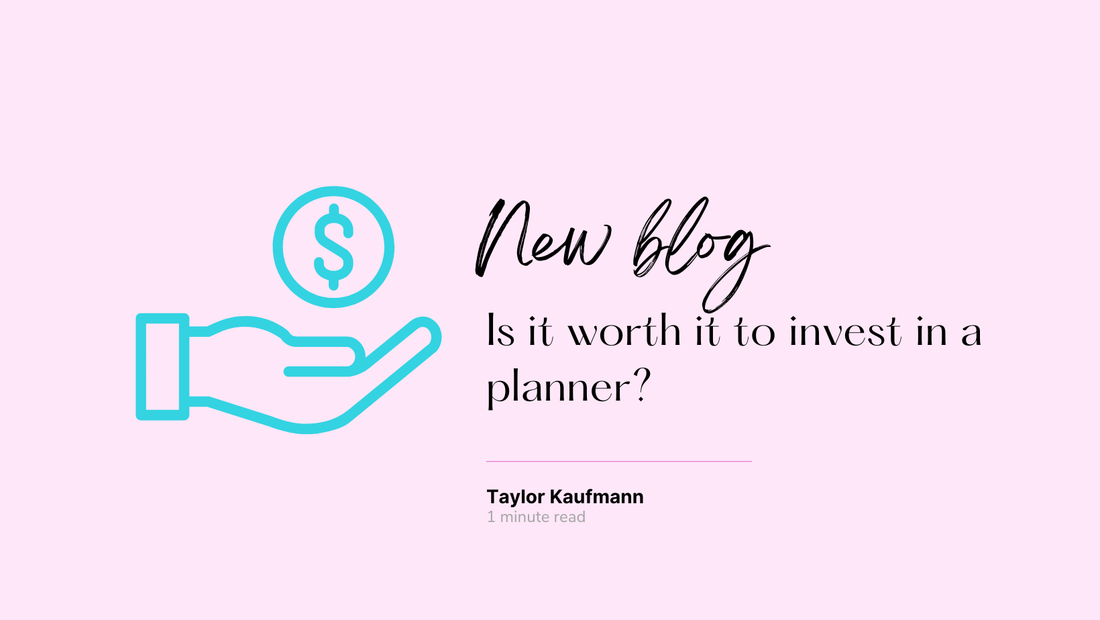
Is Spending Money on a Planner Worth It?
Taylor KaufmannShare
In a world of digital calendars and task management apps, the idea of spending money on a physical planner might seem quaint to some and extravagant to others. However, beneath the seemingly simple act of purchasing a planner lies a deeper consideration of the value it can bring to your life. Let's explore whether investing in a planner is worth it and the factors to consider before taking the plunge.
1. Organization with a Tangible Twist: Digital tools have their merits, but the tactile experience of a physical planner is unparalleled. The act of writing down tasks, appointments, and goals engages different parts of the brain and enhances memory retention. There's something deeply satisfying about flipping through the pages of a well-crafted planner that digital platforms can't replicate.
2. Goal Achievement and Focus: A planner isn't just a collection of dates; it's a space to chart your journey toward your goals. By visualizing your aspirations on paper, you commit to them more deeply. Each day becomes a step forward, and as you mark off completed tasks, you feel a sense of accomplishment that fuels your motivation.
3. Personalization and Creativity: One of the joys of using a planner is the ability to make it uniquely yours. From decorating pages with stickers and washi tape to incorporating your own artistic flair, a planner becomes a canvas for creative expression. This personal touch transforms planning from a chore into a delightful and relaxing activity.
4. Mindfulness and Reflection: A planner is more than a scheduling tool; it's a repository for your thoughts, reflections, and experiences. Dedicate a section to journaling, jot down moments of gratitude, and record your daily musings. This practice fosters mindfulness and self-awareness, contributing to your overall well-being.
5. Time Management and Prioritization: A planner encourages mindful time management. By allocating specific time blocks for tasks and appointments, you're less likely to overcommit and more likely to prioritize what truly matters. This helps you maintain a healthier work-life balance.
6. Reduced Digital Distractions: While smartphones and apps are incredibly useful, they can also be sources of distraction. A physical planner provides a tech-free zone where you can focus on planning without the pull of social media notifications or emails.
7. Cost vs. Value: While some planners can be pricey, consider the value they bring to your life. If a well-organized, goal-oriented, creatively expressive, and stress-reducing tool enhances your daily routine, the investment is likely worth it.
8. Personal Attachment and Keepsake: A planner often becomes a cherished keepsake. Flipping through the pages months or years later can evoke nostalgia and provide insights into your past aspirations, achievements, and growth.
9. Investment in Self-Care: Think of your planner as an investment in your well-being. It's a tool that supports your mental health, fosters personal growth, and helps you manage stress by providing clarity and structure.
10. Find Your Fit: Not all planners are created equal. Research different types of planners, layouts, and designs to find one that suits your needs and preferences. The right planner can become an invaluable tool you'll gladly invest in.
In the end, the decision to spend money on a planner is a personal one. If a physical planner aligns with your desire for order, creativity, and intentionality in a way that digital tools can't replicate, then the value it adds to your life might far outweigh its cost. Remember, it's not just about purchasing a planner; it's about investing in a tool that helps you invest in yourself.
The Daily Life Planner is a tool used to manage your life in all the areas to reduce overwhelm. Check it out here!
